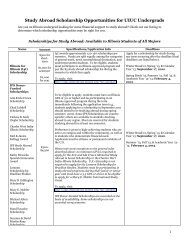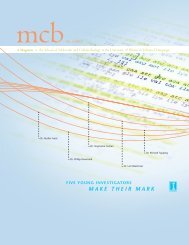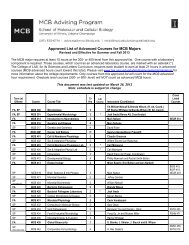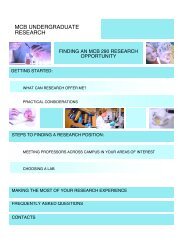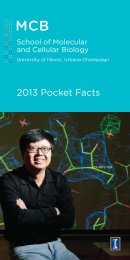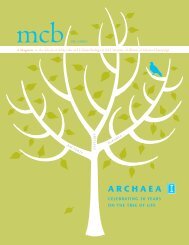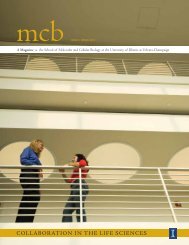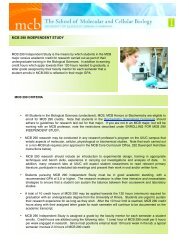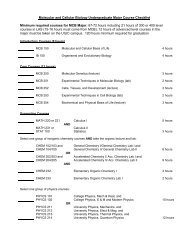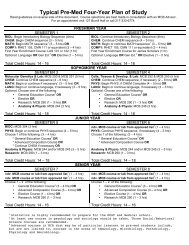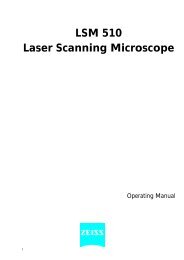breast cancer research • mcb as pre-med - The School of Molecular ...
breast cancer research • mcb as pre-med - The School of Molecular ...
breast cancer research • mcb as pre-med - The School of Molecular ...
Create successful ePaper yourself
Turn your PDF publications into a flip-book with our unique Google optimized e-Paper software.
s Y n t h e t I c<br />
b I o l o g Y o f<br />
cellular<br />
sYsteMs<br />
emergent behaviors <strong>of</strong> Integrated<br />
cellular systems center at Illinois<br />
While the behaviors <strong>of</strong> individual cells and the functions and properties<br />
<strong>of</strong> tissues and organs have been studied extensively, the complex<br />
interactions <strong>of</strong> cell clusters are not <strong>as</strong> well understood. <strong>School</strong> <strong>of</strong> <strong>Molecular</strong><br />
& Cellular Biology (MCB) <strong>research</strong>ers are members <strong>of</strong> a team<br />
that will investigate the behaviors <strong>of</strong> interacting clusters <strong>of</strong> cells with<br />
different functionalities.<br />
<strong>The</strong> National Science Foundation (NSF) awarded $25 million to establish<br />
the Emergent Behaviors <strong>of</strong> Integrated Cellular Systems (EBICS)<br />
Center at the University <strong>of</strong> Illinois at Urbana-Champaign, the M<strong>as</strong>sachusetts<br />
Institute <strong>of</strong> Technology, and the Georgia Institute <strong>of</strong> Technology.<br />
<strong>The</strong> EBICS Center is one <strong>of</strong> five Science & Technology Centers<br />
(STC) approved by NSF in a nationwide competition.<br />
<strong>The</strong> goal is to create biological modules — sensors, processors and actuators<br />
— that can be used to build working biological machines. This<br />
next step in synthetic biology will build upon the complexity and<br />
richness <strong>of</strong> biology — from regenerative <strong>med</strong>icine to developmental<br />
biology — to engineer new applications.<br />
University <strong>research</strong>ers from many different disciplines, including<br />
biology, engineering, and physical sciences, will contribute to the<br />
development <strong>of</strong> the knowledge, tools, and technologies necessary to<br />
create these highly sophisticated biological machines.<br />
<strong>The</strong> list <strong>of</strong> participants includes three MCB faculty.<br />
Pr<strong>of</strong>essor <strong>of</strong> Cell and Developmental Biology Fei Wang will develop<br />
new technologies to induce efficient differentiation <strong>of</strong> embryonic<br />
stem cells into neurons, myocytes, and endothelial cells. Production<br />
<strong>of</strong> the differentiated cells is a critical first step towards the establishment<br />
<strong>of</strong> interactions <strong>of</strong> cell clusters and the creation <strong>of</strong> cellular machines.<br />
<strong>The</strong> Wang lab already developed conditions for efficient neural<br />
conversion from human embryonic stem cells to neural progenitors,<br />
and will continue to derive fully differentiated neurons. <strong>The</strong> Wang<br />
lab will also collaborate with other members <strong>of</strong> the STC to generate<br />
large-scale functional myocytes and endothelial cells from embryonic<br />
stem cells.<br />
Affiliate Pr<strong>of</strong>essor <strong>of</strong> <strong>Molecular</strong> and Integrative Physiology YingXiao<br />
(Peter) Wang, will develop genetically encoded reporters b<strong>as</strong>ed on fluorescent<br />
resonance energy transfer to visualize and quantify signaling<br />
transduction in live cells with high tempo-spatial resolution. <strong>The</strong>se<br />
tools will be specifically designed and applied to monitor the intracellular<br />
molecular activities when cells interact with their neighbors<br />
and with the surrounding mechanical/physical/chemical environment.<br />
<strong>The</strong> results should provide spatio-temporal maps <strong>of</strong> molecular<br />
activities and hierarchies governing the cell-cell and cell-environment<br />
interactions.<br />
Alumni Pr<strong>of</strong>essor <strong>of</strong> Cell and Developmental Biology Martha Gillette,<br />
co-director <strong>of</strong> <strong>research</strong> for the project, will study clusters <strong>of</strong> neurons<br />
with genetically engineered properties that control clusters <strong>of</strong> myocyte<br />
and endothelial cells in micro-environments.<br />
<strong>The</strong> Center aims to advance <strong>research</strong> in complex biological systems,<br />
create new educational programs b<strong>as</strong>ed on this <strong>research</strong>, and demonstrate<br />
leadership in its involvement <strong>of</strong> groups traditionally underre<strong>pre</strong>sented<br />
in biology, physical science, and engineering. <strong>•</strong><br />
Neurons will serve <strong>as</strong> sensors in the biological machine, but they will also need to be able to control the muscle cells to pump chemicals through vessels.<br />
Image <strong>of</strong> neurons by Larry Millet and Janet Sinn-Hanlon, Visualization Laboratory <strong>of</strong> the Imaging Technology Group.<br />
SCHOOL OF MOLECULAR AND CELLULAR BIOLOGY . 13




